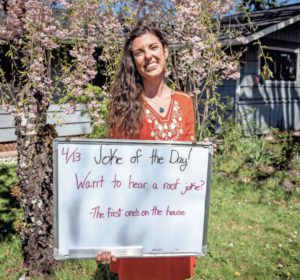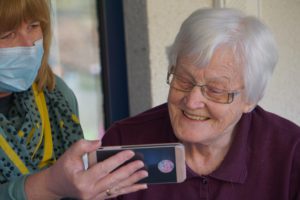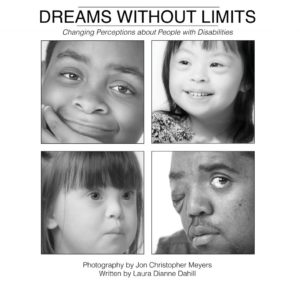More Snap Peas Please
There was one moment using the Picture Planner visual calendaring program back in 2001 that particularly sticks out for me.
Through the Eugene 4J Schools Community Living Program, students have the opportunity to volunteer at a nearby community garden. Like many people with autism spectrum disorders, my students that year had very restricted diets. Many of the students refused to eat vegetables. One person had never eaten foods that were a different color other than white.
At the garden it was incredible to see the students interact with food in an entirely different way. They began to go to the garden and see the full cycle of plants from the time the seeds were first planted until the vegetables were harvested.
All along the way, the students and I were taking pictures while having this experience. I will never forget the moment that a couple of my students tried and tasted a snap pea for the first time. During the visits to the garden that they scheduled with Picture Planner the students had watched the pea grow from a seed into a plant, capturing this cycle along the way.
To document the activity, we took a picture of each of us holding up and crunching down on a pea. It wouldn’t be the last time those students would continue to learn about gardening, give back to their community, and discover the benefits of homegrown food.
This experience became a visual touchstone that has shaped my own professional career. Yes, technology can improve accessibility, but its much more than that: it can also enhance the personal autonomy and self- reflection that foster self-determination. Giving people tools to share, reflect, and record their accomplishments both educationally and throughout their lives is a benefit of technology that is too often overlooked.
Seeing themselves in those images doing the gardening activity was powerful, and in recent years the evidence-base for this kind of self-modeled behavior has been growing. In those early days, however, watching students use Picture Planner schedules that were individualized to capture personal engagement in everyday activities, I began to believe that giving individuals with exceptionalities technological tools for self-management was more than an issue of accessibility. It was and continues to be as much about their personal dignity and capacity to understand and exert greater control over their lives.
By creating and developing tools for people to look back and take pride in their experiences we may be motivating them to participate in life in ways we can’t yet imagine or appreciate.
Tobias Rickard has been an Autism Consultant for the Eugene 4J School District in Eugene Oregon since 2005. Prior to consulting, Toby was a Special Education teacher and received his Masters in Special Education from the University of Oregon, with an emphasis on positive behavior support. Before teaching, Toby was an Employment Specialist in Boulder, Colorado supporting individuals with autism and other exceptionalities with their vocational pursuits. Toby has previously been active in Oregon Council for Exceptional Children, holding various leadership positions within the state unit. Toby is an active member of his disability community as a long-term board member of the local non-profit Supporting Access to Independent Living and as an advisory board member of KindTree Autism Rocks, both located in Eugene. Toby’s areas of interest are in student advocacy, transition, and accessibility. Particularly, the development of student-centered technologies and universal design for learning.



